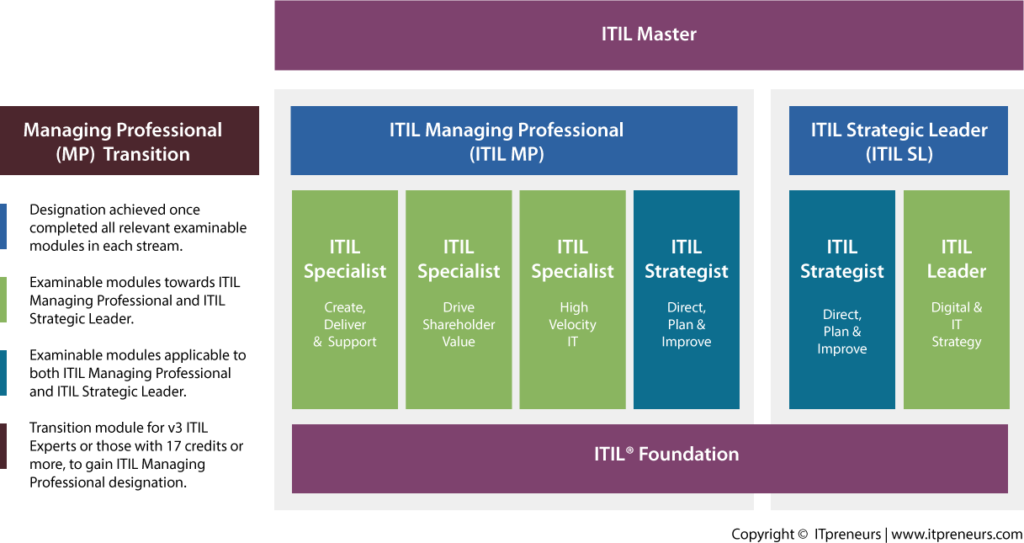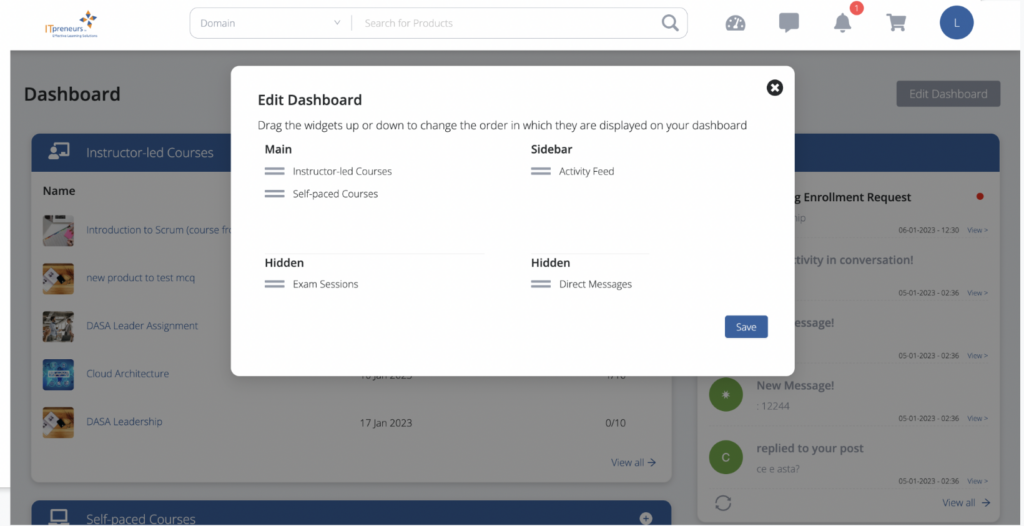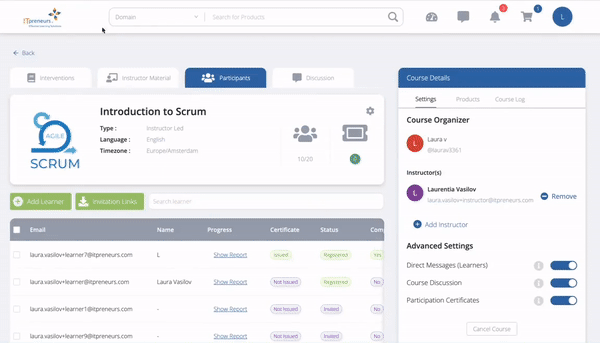Table of Contents
ITIL in general
- ITIL, a professionally recognized certification scheme, supports organizations and individuals to gain optimal value from IT and digital services. It helps define the direction of the service provider with a clear capability model and aligns them to the business strategy and customer needs.
- ITIL provides comprehensive, practical and proven guidance for establishing a service management system. It also provides a common language (glossary of terms) for businesses using IT-enabled services.
ITIL 4 specific
- We are in a time of unprecedented change, known as the ‘Fourth Industrial Revolution’. This is characterized by the digital transformation of our world and the unavoidable interaction between humans, digital technologies and physical assets. It creates an increasingly fast-paced and complex environment, requiring organizations to be more agile, better equipped to adapt what they do, and ready to adopt new ways of working to succeed. The ITIL 4 framework helps organizations to connect and align these different challenges that are relevant not only to ITSM professionals, but also to a wider range of professionals working in the digital world.
- ITIL 4 expands on previous versions by providing a practical and flexible basis to support organizations on their journey to the new world of digital transformation. It provides an end-to-end IT/digital operating model for the delivery and operation of tech-enabled products and services. IT teams are enabled to continue to play a crucial role in the wider business strategy.
- ITIL 4 supports the existing investment that people and organizations have made in ITIL, as it is an expansion on the existing framework. That investment is protected because ITIL 4 provides a practical and flexible transition that helps organizations adopt the new ways of working of the modern digital world.
ITIL Relevance
Why is there a need for an update to ITIL?
- ITIL is used by millions of professionals globally. Businesses are built on ITIL. Every year, organizations invest heavily in adopting and adapting ITIL into their business practices and upskilling their workforce with ITIL qualifications.
- Extensive research by AXELOS, involving a diverse group of stakeholders (+2,000), has consistently shown that ITIL is fundamental to businesses, enabling transformation and helping organizations realize value.
- We understand the need for a smooth transition from ITIL v3 to ITIL 4 and recognize the need to ensure that your investment in ITIL continues to drive and enhance your business’ performance. Therefore, you can feel reassured that ITIL 4 has been developed to be compatible with the existing certification scheme.
- In addition, all current certifications for ITIL will always remain valid following the update, and all ITIL v3 credits gained can help learners on their ITIL journey in the new certification scheme.
- The evolution in ITIL guidance will allow organizations to continue to derive value from their existing investments, whilst showing a way forward to a faster, more flexible, and adaptive approach.
- The fact that ITIL remains relevant is key. We would like to help you to reaffirm the proven relevance of ITIL today and its current and ongoing impact within organizations. We also want to help you reassure your customers that their current certifications remain relevant and to encourage professionals to continue on their ITIL journey to Expert.
- ITIL supports organizations and individuals to gain optimal value from IT and digital services. It helps define the direction of the service provider with a clear capability model and aligns them to the business strategy and customer needs. ITIL, a professionally recognized certification scheme, provides comprehensive, practical and proven guidance for establishing a service management system, providing a common glossary of terms for businesses using IT-enabled services.
What is the relevance of ITIL v3 now that ITIL 4 will be released?
- New students should still pass the ITIL v3 Foundation exam because it continues to support organizations and individuals to gain optimal value from IT and digital services. It equips a student with a clear capability model, aligning them to the current business strategy, current needs, and the current way of working within the organization.
- ITIL continues to support organizations and individuals to gain optimal value from IT and digital services. It equips a service provider with a clear capability model, aligning IT to the business strategy and customer needs.
- ITIL, a globally recognized framework, provides comprehensive, practical and proven guidance for establishing an IT service management system, encouraging consistency and continual improvement for businesses using IT-enabled services.
- The ITIL Best Practice framework provides a common language and tools that power collaboration within IT teams to deliver value across a business.
- ITIL is the global standard in IT best practice, and is used globally by millions of practitioners. It is relied upon by 90% of the FORTUNE 500 to run their IT operations.
- The ITIL Foundation level provides a high-level overview, and the Practitioner certification focuses on how to practically adopt and adapt the ITIL framework, but those who want to demonstrate knowledge of the entire ITIL scheme should work through the Intermediate credit system to become an ITIL Expert.
- The principles, processes and activities covered within the ITIL v3 provide essential knowledge that will contribute to a better comprehension of ITIL 4 concepts reflected on the updated framework. It will keep supporting professionals with the challenges faced in their work environment. Candidates who continue on their v3 journey will gain valuable skills to help solve their business challenges now.
- While ITIL Foundation level gives a high-level overview, and Practitioner focuses on how to practically adopt and adapt the ITIL framework, those who want to demonstrate knowledge of the entire ITIL scheme, should work through the Intermediate credit system to become an ITIL Expert.
- Besides the fact that the knowledge gained in ITIL v3 is still relevant and valuable in ITIL 4, it is recommended to start or continue to invest in ITIL v3 Intermediate level courses or Practitioner course because:
- The credits you earn for the ITIL v3 Intermediate/Practitioner level courses have value in the transition scheme to get the ITIL Managing Professional certification in ITIL 4.
- The knowledge gained in the ITIL v3 Intermediate/Practitioner courses are based on good practice, which is also very relevant in ITIL 4. That knowledge can already be applied in helping the organization moving forward.
- Waiting for the levels Specialists, Strategist or Leader courses is possible, but realize that these courses are expected to be released earliest in the 2nd half of 2019. Starting or continuing with the ITIL v3 Intermediates/Practitioner makes it possible for students to get the required credits for the ITIL Managing Professional Transition Module the moment it is available.
- ITIL v3, a globally recognized framework, provides comprehensive, practical and proven guidance for establishing an IT service management system, encouraging consistency and continual improvement for businesses using IT-enabled services.
- The ITIL Best Practice framework provides a common language and tools that power collaboration within IT teams, to deliver value across a business.
- ITIL is the global standard in IT best practice and is used globally by millions of practitioners. It is relied upon by 90% of the FTSE 500 to run their IT operations.
What is the relevance of ITIL 4 given the strong adoption of ITIL v3?
- ITIL 4 is designed to help businesses navigate the new technological era, commonly known as the Fourth Industrial Revolution. The speed of current breakthroughs is disrupting almost every industry on a global scale. The Fourth Industrial Revolution is marked by emerging technologies including robotics, artificial intelligence, nanotechnology, quantum computing, biotechnology, the Internet of Things (IoT), 3D printing, autonomous vehicles and much more.
- ITIL 4 will provide a practical and flexible basis to support organizations on their journey into the new world of digital transformation by helping them align their human, digital and physical resources to compete within the modern complex landscape.
- The context of ITIL, with the release of ITIL 4 is now much bigger, with an emphasis on the business and technology world, how it works today, and how it will work in the future with Agile, DevOps and digital transformation.
- ITIL, with the release of ITIL 4 is now much more relevant to software developers, service management practitioners and businesses through promoting a holistic view of delivering products and services. Starting with the Foundation level, ITIL 4 will emphasise the importance of collaboration, transparency, automating where possible, and working holistically.
- ITIL 4 retains many of the core elements that makes ITIL so valuable to individuals and organizations today. Change is a constant state and organizations are struggling to navigate it. ITIL 4 is best practice that supports organizations in navigating this ongoing change.
- ITIL 4 is the next iteration that incorporates all of the best things from ITIL as it is known today and expands IT and service operations to a new level. Moving from traditional process lead delivery, ITIL 4 supports faster, quality and value-driven delivery for people and organizations.
- Right from Foundation level, ITIL 4 will emphasize the importance of collaboration, transparency, automating where possible, and working holistically.
What are the main differences between ITIL v3 and ITIL 4?
ITIL 4 is an evolution of the ITIL framework. The major changes found in ITIL 4 are summarized below.
Service value system
ITIL has evolved beyond the delivery of services and now provides end-to-end value delivery. The focus is on the co-creation of value through service relationships.
The updated framework focuses on facilitating value co-creation via a service value system (SVS). The SVS represents how different components and activities can work together, in any type of organization, to facilitate value creation through IT-enabled services.
In ITIL 4, customers are an essential element in the process of value creation.
Service value chain
Incorporated within the SVS is the service value chain (SVC). The service value chain is the set of interconnected activities that, when sequenced in the right way, provides an operating model for the creation, delivery, and continual improvement of services. The service value chain allows an organization to define a number of variants of these sequences known as value streams, of which the v3 service lifecycle is one such example.
The service value chain is flexible and can be adapted to multiple approaches, including product-focused delivery teams, DevOps, and centralized IT.
The adaptability of the value chain enables organizations to react to changing demands from their stakeholders in the most effective and efficient ways.
Guiding principles
The ITIL guiding principles, first introduced in ITIL Practitioner, are at the core of ITIL 4.
The guiding principles help IT professionals to adopt and adapt ITIL guidance to their own specific needs and circumstances. These guiding principles can (and should) be followed at every stage of service delivery. They allow professionals to define approaches and navigate difficult decisions.
The ITIL guiding principles are:
- Focus on value
- Start where you are
- Progress iteratively with feedback
- Collaborate and promote visibility
- Think and work holistically
- Keep it simple and practical
- Optimize and automate
The guiding principles provide a comprehensive and holistic vision of how a service (as well as a service management) organization should manage and execute its work. The focus on collaboration, automation, and keeping things simple, reflects principles found in Agile, DevOps and Lean methodologies.
ITIL Practices
What is currently known in ITIL v3 as “processes” are being expanded to consider other elements such as culture, technology, information and data management, and more. This holistic vision of a way of working is known as a “practice” in ITIL 4, and forms a fundamental part of the ITIL 4 framework.
The ITIL practices described in ITIL 4 will maintain the value and importance provided by the current ITIL processes, whilst at the same time expand to be integrated into different areas of service management and IT, from demand to value. The ITIL 4 framework will reinforce a flexible and non-siloed approach for the application of ITIL practices.
Four Dimensions
To support a holistic approach to service management, ITIL also defines four dimensions that collectively are critical to the effective and efficient facilitation of value for customers and other stakeholders in the form of products and services.
The four dimensions represent perspectives which are relevant to the whole service value system.
All apply to both service management and to the services being managed across the whole organization.
Integration with other practices and new ways of working
ITIL 4 will reflect other frameworks and integrate new ways of working including Agile, DevOps, Lean, IT governance and leadership. The guiding principles draw from proven ways of working and foster a customer centric culture of collaboration, working holistically and gaining continual feedback. ITIL 4 will provide the flexibility needed to adopt and adapt what is relevant to each business and organizations while reinforcing the fundamentals for delivering quality IT service.
All of this sets ITIL and service management in a strategic context, bringing together ITSM, Development, Operations, business relationships and governance in a holistic approach. This is a truly integrated model for digital service management.
The ITIL 4 framework also includes governance activities that enable organizations to continually align their operations with the strategic direction set by the governing body.
ITIL 4 provides organizations with a simple and practical improvement model to maintain their resilience and agility in a constantly changing environment.

ITIL 4 Foundation
ITIL 4 takes you through a service value system which provides a holistic picture of what it really means to contribute to business value.
The Foundation level is designed as an introduction to ITIL 4 and enables candidates to look at IT service management through an end-to-end operating model for the creation, delivery and continual improvement of tech-enabled products and services.
ITIL 4 Foundation candidates will have an understanding of the following:
- A holistic approach to the co-creation of value with customers and other stakeholders in the form of products and services
- The Guiding principles of ITIL 4
- The four dimensions of service management
- Key concepts from Lean IT, Agile, DevOps, and why these are important to deliver business value
- How ITIL practices described in ITIL 4 will maintain the value and importance provided by the current ITIL processes, whilst at the same time expand to be integrated into different areas of service management and IT, from demand to value.
ITIL 4 Managing Professional (ITIL MP)
ITIL 4 Managing Professional (ITIL MP) targets IT practitioners working within technology and digital teams across businesses. The Managing Professional (MP) stream provides practical and technical knowledge about how to run successful IT-enabled services, teams and workflows.
ITIL 4 Managing Professional consists of four modules:
- ITIL 4 Specialist Create, Deliver and Support
- ITIL 4 Specialist Drive Stakeholder Value
- ITIL 4 Specialist High Velocity IT
- ITIL 4 Strategist Direct Plan and Improve (universal module)
To obtain the designation ITIL 4 Managing Professional or ITIL 4 Strategic Leader, the candidate must complete all modules in each stream, with ITIL Strategist being a universal module for both streams.
ITIL 4 Specialist Create, Deliver and Support
This module covers the ‘core’ service management activities and expands the current scope of ITIL to cover the ‘creation’ of services. This module focuses on the integration of different value streams and activities to create, deliver and support IT-enabled products and services whilst also covering supporting practices, methods and tools.
This module will also cover service performance and will give practitioners an understanding of service quality and improvement methods.
It will enable IT practitioners to continue to deliver innovative yet reliable tech-enabled services to their customers in an increasingly competitive market.
ITIL Specialist Create, Deliver and Support is aimed at ITSM practitioners managing the operation of IT-enabled & digital products and services, and those responsible for the end-to-end delivery.
ITIL 4 Specialist Drive Stakeholder Value
This module covers all types of engagement and interaction between a service provider and their customers, users, suppliers and partners. It focuses on the conversion of demand into value via IT-enabled services.
The module covers key topics such as SLA design, multi-supplier management, communication, relationship management, CX and UX design, customer journey mapping, and more.
It will provide candidates with the tools to increase stakeholder satisfaction which is integral to business success in the current competitive landscape.
ITIL Specialist Drive Stakeholder Value is aimed at practitioners who are responsible for managing and integrating stakeholders, focus on the customer journey and experience, and/or are responsible for fostering relationships with partners and suppliers.
ITIL 4 Specialist High Velocity IT
This module explores the ways in which digital organizations and digital operating models function in high velocity environments. It will help aspiring organizations to operate in a similar way to successful digitally-native organizations.
This module includes the use of working practices such as Agile and Lean, and technical practices and technologies such as Cloud, Automation, and Automatic Testing, focusing on rapid delivery of products & services to obtain maximum value.
ITIL Specialist High Velocity IT is aimed at IT managers and practitioners involved in digital services or working in digital transformation projects, working within or towards high velocity environments.
ITIL 4 Strategist Direct Plan and Improve
This module provides individuals with the practical skills necessary to create a ‘learning and improving’ IT organization, with a strong and effective strategic direction.
The module covers the influence and impact of Agile and Lean ways of working, and how they can be leveraged to an organization’s advantage.
It will provide practitioners with a practical and strategic method for planning and delivering continual improvement with the necessary agility.
ITIL Strategist Direct Plan and Improve is aimed at managers of all levels involved in shaping direction and strategy or developing a continually improving team. It will cover both practical and strategic elements.
Therefore, it is the universal module which will be a key component of both streams, ITIL 4 Managing Professional and ITIL 4 Strategic Leader.
Accredited training for the ITIL 4 Managing Professional modules is mandatory to enable full understanding of the core material. All modules have ITIL 4 Foundation as a prerequisite. ITIL 4 Managing Professional is due to be launched later in 2019 and in early 2020.
ITIL 4 Strategic Leader (SL)
ITIL 4 Strategic Leader (ITIL SL) recognizes the value of ITIL, not just for IT operations, but for all digitally-enabled services. Becoming an ITIL SL demonstrates that the individual has a clear understanding of how IT influences and directs business strategy.
ITIL 4 Strategic Leader consists of two modules:
- ITIL 4 Strategist Direct Plan and Improve (universal module)
- ITIL 4 Leader Digital and IT Strategy
To obtain the designation ITIL MP or ITIL SL, the candidate must complete all modules in each stream, with ITIL Strategist being a common module for both streams.
ITIL 4 Strategist Direct Plan and Improve (duplication from ITIL MP)
The purpose of this module is to provide individuals with the practical skills necessary to create a ‘learning and improving’ IT organization, with a strong and effective strategic direction.
The module covers the influence and impact of Agile and Lean ways of working, and how they can be leveraged to an organization’s advantage.
It will provide practitioners with a practical and strategic method for planning and delivering continual improvement with the necessary agility.
ITIL Strategist Direct Plan and Improve is aimed at managers of all levels involved in shaping direction and strategy or developing a continually improving team. It will cover both practical and strategic elements.
Therefore, it is the universal module which will be a key component of both streams, ITIL 4 Managing Professional and ITIL 4 Strategic Leader.
ITIL 4 Leader Digital and IT Strategy
This module will focus on the alignment of digital business strategy with IT strategy. The module also covers how disruption from new technologies are impacting organizations in every industry and how business leaders are responding.
The pace of evolution in the digital world has never been so fast and organizations need to be flexible and adapt to the ever-changing environment if they want to keep providing value to their customers while remaining competitive in the marketplace.
The IT & Digital Strategy module adds a new perspective to the ITIL suite and elevates the discussion around ITIL concepts to a strategic level among business leaders and aspiring leaders.
The module will help IT leaders and aspiring leaders build and implement effective IT and digital strategy that can tackle digital disruption and drive success.
Accredited training for the ITIL 4 Strategic Leader modules is mandatory to enable full understanding of the core material. ITIL 4 Foundation is a prerequisite for ALL modules. In addition, the ITIL Leader modules requires a minimum of three years of IT managerial experience.
ITIL 4 Managing Professional transition module
The Managing Professional transition module is designed to allow ITIL v3 candidates who have already invested to easily transition across to ITIL 4. They can gain the designation of ITIL 4 Managing Professional via one course and one exam.
The transition module enables candidates to recognise their previous achievements while still gaining the up-to-date skills and knowledge needed to navigate the digital service economy.
The module will provide information on the key elements of the following modules from ITIL 4 Managing Professional:
- ITIL 4 Specialist Create, Deliver and Support
- ITIL 4 Specialist Drive Stakeholder Value
- ITIL 4 Specialist High Velocity IT
- ITIL 4 Strategist Direct Plan and Improve
The course will also provide an introduction and cover the key concepts found in ITIL 4 Foundation.
To take the transition module, all candidates must be at Expert level or have a minimum of 17 v3 credits. It is therefore aimed at candidates who have a strong knowledge of ITIL v3.
Accredited training for the ITIL 4 Managing Professional transition module is mandatory to enable full understanding of the core material.
ITIL 4 Master
The Master level is the highest achievable level of ITIL, and there are currently only around 100 in the world. It is a huge achievement, and one that holds a lot of prestige within the IT service management community.
To achieve the ITIL 4 Master certification, professionals must be able to explain and justify their ability to apply the principles, methods and techniques from ITIL in the workplace. In addition, candidates must have both the ITIL 4 Managing Professional (ITIL MP) and ITIL 4 Strategic Leader (ITIL SL) designations.
About the author

When I’m not at work, I’m usually … working. Yeah, I’m a workaholic. But in a good way. My passion is creating new and exciting products that do not only function well but are also a pleasure for the eye. I hate ugly and rushed products. I prefer to put in a bit of extra work to make an “ok” product or experience an amazing product or experience.

As an IT Service Management trainer, consultant and line manager with over 25 years of experience in IT, Marcel has performed strategic and tactical assignments in a wide variety of areas. For the ITIL 4 update, Marcel has been part of the ITIL 4 Lead Architect Team and Review Team at AXELOS. Through his association with AXELOS, Marcel comprehends the background, the architecture, and the underlying reasons of the ITIL 4 update.
Related Courseware
Sorry, we couldn't find any posts. Please try a different search.



